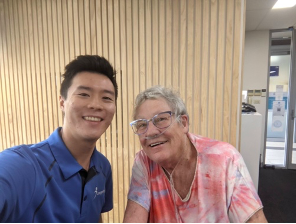Annabel investigates…. How does social media affect your mental health and the motivation to exercise?
With social media becoming a large part of our lives, it has been shown to negatively affect an individual’s mental health, which can decrease one’s motivation to participate in physical activity. It is crucial to understand your motivation to exercise.
Do you exercise to enhance your appearance, or do you exercise for sheer enjoyment?
Today, Annabel and the Longevity Exercise Physiology teams at Drummoyne, Edgecliff, Marrickville, Bella Vista, Randwick, Pymble, Balmain and Neutral Bay discuss the ways in which social media can affect people of all age’s mental health and how this can have a negative impact on their mental health.
Social media can have both a positive and negative influence on individuals in the way it affects their motivation to participate in physical activity. 96.4% of Australian internet users between 16 and 64 accessed a social media network or messaging service in December 2020, therefore, many individuals rely on social media to connect with each other. While these sites and platforms have its benefits, it’s important to remember that social media should not be replaced for real-world human connection. When an individual spends too much time engaging in the social world it can make you lonelier and more isolated and thus exacerbate mental health such as anxiety and depression (Divine, Watson, Baker & Hall, 2019).
96.4% of Australian internet users between 16 and 64 accessed a social media network or messaging service in December 2020
As we delve into the studies, one research article found that the more time that female participants spent using online social media platforms, the higher the levels of thin-idealisation, objectified body consciousness and increased motivation to partake in physical activity. Another study identified that women with a positive body image reported that that they exercise regularly to increase their well-being. Those individuals who use social media frequently, often compare themselves with unrealistic ideals that have been portrayed, which can lead to feelings of failure and motivation to engage heavily in dieting and exercise (Graff & Czarnomska, 2019).
The more that young people watch fitness videos on social media, the more mental health conditions that develop. Social media can be useful in being able to motivate people through inspirational videos, but some videos on social media can be very manipulating. Another article identified a similar result in which those who spent longer on social media had significantly lower levels of exercise motivation.
It established that exposure to ‘fitspiration’ images (those which motivate a person to maintain or improve their fitness) lead to higher scores on measures of compulsive exercise and disordered eating among women.
(Fatt, Fardouly & Rapee, 2019)

Individuals feel the need to feel connected with others and this feeling of connection influences our wellbeing and motivation. There are always two sides of every topic, with a study identifying that providing supportive physical activity environments within social media sites may be a successful avenue to get people exercising. Therefore, when individuals are feeling connected to others when using these sites, it increases the types of motivation associated with prolonged exercise and physical activity engagement. The study did, however, also identify a potential maladaptive side of social media resulting from social comparisons, bullying, and feeling left out. As such when interactions on these sites are not positive, including negative comments about one’s own exercise behaviour, or negative social comparison, this can lead to individuals feeling disconnected and will negatively affect exercise motivation (Divine, Watson, Baker & Hall, 2019).
Social media sites are being used by increasingly younger children, so it is important to understand the motivation and mental health aspects of individuals. Decreases in motivation towards exercise are becoming a widely common theme within this population group. Understanding their concerns and the reasons behind their motivation levels is a key aspect to changing this trend.
If you want to know more about how you can improve your mental health with an individualised exercise program, give Longevity Exercise Physiology Edgecliff, Pymble, Marrickville, Randwick, Drummoyne, Balmain, Bella Vista, and Neutral Bay a call on 1300 964 002 to book in a session today!

Written by Annabel Bergman
References:
Divine, A., Watson, P., Baker, S., & Hall, C. (2019). Facebook, relatedness, and exercise motivation in university students: A mixed methods investigation. Computers In Human Behaviour, 91, 138-150. doi: 10.1016/j.chb.2018.09.037
Fatt, S., Fardouly, J., & Rapee, R. (2019). Links between viewing fitspiration posts, muscular-ideal internalisation, appearance comparisons, body satisfaction, and exercise motivation in men. New Media & Society, 21(6), 1311-1325. doi: 10.1177/1461444818821064
Graff, M., & Czarnomska, O. (2019). Can Time Spent on Social Media Affect Thin-Ideal Internalisation, Objectified Body Consciousness and Exercise Motivation in Women?. Psychreg Journal Of Psychology, 3(3).

